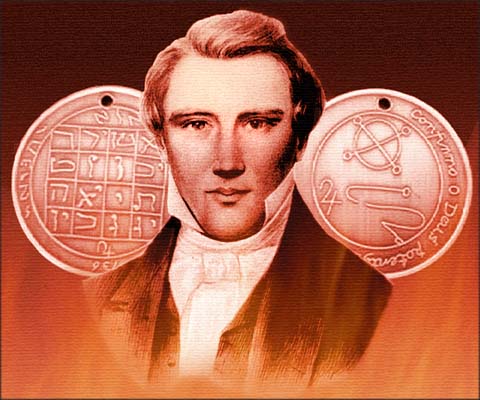Markk wrote:...
Simply from a Biblical perspective would you consider Joseph Smith a false prophet?
I'm not sure I would even admit Smith into the ranks of false prophets -- perhaps
"prophet-pretenders" would be a better peer group for him. Which does not mean
that God did not make some use of Smith. The biblical God can make use of plagues,
talking asses and the scourge of the Assyrian army for various purposes.
By the standards of Deuteronomy, Smith became a false prophet when his revelation
regarding the selling of the Book of Mormon copyright was voiced --- if we can trust David Whitmer's
memory of that episode. But then again, by the standard of having every prediction of
the future come true, I would suppose that most "prophets" become "false prophets,"
sooner or later. I have never considered the test of a prophet to be his ability to
perfectly predict the future.
So -- did Joseph Smith, Jr. fulfill a prophetic calling? According to the RLDS and
Community of Christ, yes. According to Dale Broadhurst: "I do not know."
Somehow I doubt that such a testimony would be welcome in an LDS F&T Sunday
meeting: "....and finally, brethren, I stand before you to bear witness of the truth,
that our beloved first President and Martyr, Joseph the Seer, was perhaps a prophet,
or perhaps not......" Sounds like a problem to me.
I would argue that the very most of Protestant faiths are "Covenant people", in that they would teach they are under the covenant of Grace, a new law, the law of Grace. Got a link for your definition of the convent the LDS church is under, I would love to read it?
I probably have something I've written on that subject, somewhere. Let me look.
But for the moment, I will say that I do not believe in dispensational covenants -- one to Noah,
Abraham, one to Moses, one to David, etc.
Rather, I believe in a single covenant, which human beings have become aware of in stages,
throughout sacred history. At one point, it was Israelites superimposing Near Eastern
imperial covenants upon their understanding of YHWH: The emperor will protect his far-flung
subjects, if they promise to obey the emperor -- in witness whereof a covenant is "cut" and
an animal sacrificed (as reward, threat and expiation) -- and a testament of the agreement
is written down and stored away in a sealed casket, etc. etc.
At a later stage in sacred history, I see Isaiah saying that all the nations of the world are
welcome to join in God's Peaceful Kingdom. At a still later stage, I see Jesus re-enacting
the annual meal of remembrance for a dead family member (as mentioned by Jeremiah),
in which the bread is taken prior to the wine (the reverse of the Passover seder), and
telling his disciples that the testament to the covenant was his own body and blood.
At a still later stage, I see latter day saints struggling to fathom what it means to be
a covenant people, while not being so exclusive that they build another Nauvoo, or
construct another golden calf.
I have an interest in Presbyterian covenant theology -- which is Calvinistic and which
is articulated in terms of "the elect" and God's "sovereign grace."
Explain what covenant "the elect" have been participants in, throughout all history,
and you may begin to understand my views.
Problem is -- Calvin's Geneva did no better that Joe Smith's Nauvoo. Our understanding of
what it means to "gather" as a "covenant people" still has some room for evolution.
UD
